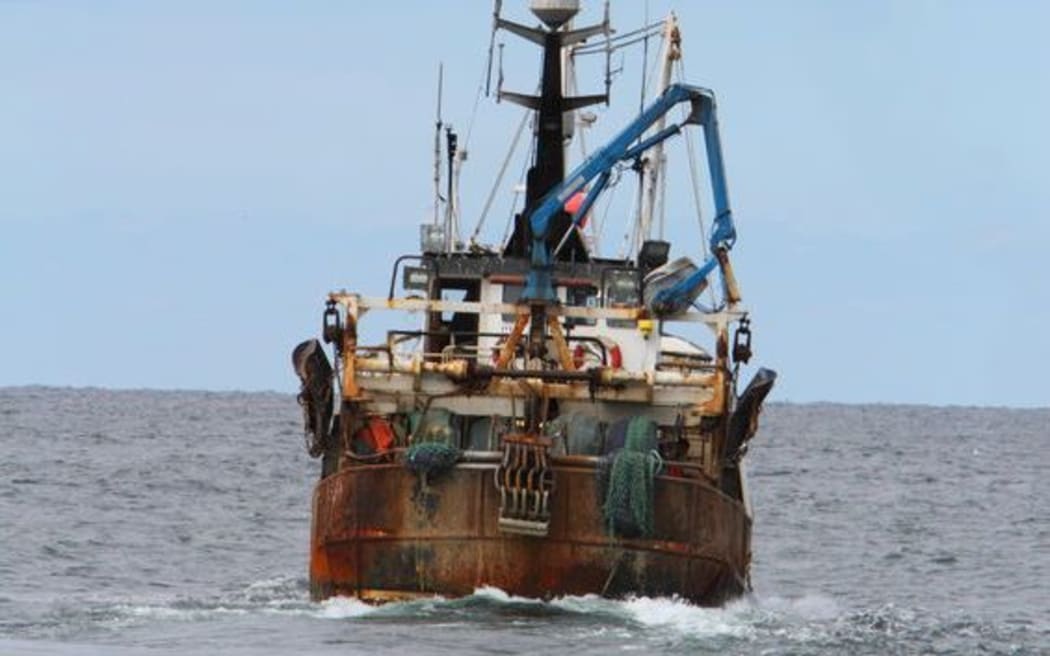A group of 26 Indonesian fishermen are fighting to get up to $6 million in unpaid wages after allegedly working in "abject conditions" in New Zealand waters.
The men worked on Sajo Oyang trawlers over four years until December 2011, while living in spaces "riddled with cockroaches", "sleeping in wet bedding" and eating food that "had fleas it in", said their lawyer.

The men worked on trawlers for over four yeras (file picture). Photo: 123RF
Two trawlers owned by Sajo Oyang, a the South Korean corporation, were forfeited to the government in 2012 and 2014 after an investigation into fisheries crimes.
In December 2015 the High Court ruled the trawlers should be sold to allow the fishermen to be paid what they were owed, however Sajo Oyang wants them returned, and on 12 October its appeal will be heard in the Court of Appeal.
The men's lawyer, Karen Harding, said should the company lose, it will inevitably take its case to the Supreme Court.
She said further proceedings to determine exactly how much each man was owed would also be necessary.
Sajo Oyang, through its New Zealand-based lawyer Bruce Squire, has argued that legally the men have no right to claim relief from forfeited vessels, which still belong to the company.
In his submission filed with the Court of Appeal dated 14 September, Mr Squire said the High Court had subjectively expanded on what the law outlines for forfeited property.
'This happened in New Zealand'
Ms Harding said they lived in "abject conditions" and deserved compensation.
"The crew members lived in tight spaces riddled with cockroaches, they had to sleep in wet bedding, the food had fleas in it, there was one toilet for about 30 fishermen, they had to bathe together in the same sea water and some got skin diseases, they would try to make their own gloves out of random equipment," Ms Harding said.
"They had to work between 18 and 20 hour days every single day on two-year contracts and if a lot of catch was caught they would have to work even longer than that.
"This happened in New Zealand, under our wage laws."
Ms Harding also alleged there was physical and sexual abuse aboard the trawlers, and compared the conditions to slavery.
She said the most experienced fishermen were paid up to $290 a month, and estimated they were collectively owed between $4m and $6m.
"The fishermen did willingly sign up for the jobs, but they thought they were coming to work in New Zealand because it was a safe place," she said.
"They had to put up their family homes to get the jobs as collateral, one put up their neighbour's vehicle, another put up their primary school graduation certificate and if they walked off the job they would have lost all their wages and the security they put up."
In 2011, a University of Auckland report by Christina Stringer, Glenn Simmons and Daren Coulston into the conditions found further sexual abuse allegations.
"What happens at sea stays at sea. No one talks about it, that's always been the culture ... we are governed by a secrets policy ... you have to be so bloody cautious about who you talk to or what you talk about," said one of the men.
The men currently live below the poverty line in third-world conditions in Indonesia. Many are currently unemployed.
The Jakarta Post reported yesterday that Indonesia's Maritime Affairs and Fisheries Minister Susi Pudjiastuti said hundreds of thousands of Indonesian crewmen lived in slave-like conditions in waters across the globe.
She said unregistered crewmen were enslaved and faced threats of being thrown overboard if they refused to comply.
Reform follows sinking
In 2010, one of Sajo Oyang's trawlers sank in New Zealand waters, killing six men.
That sparked a government investigation and consequently all foreign charter vessels must now be New Zealand-flagged.
After the law came into effect in May, the Minister for Primary Industries, Nathan Guy, said it would ensure fair standards for all fishing crews.
The company's lawyer has not responded to a request for comment.



